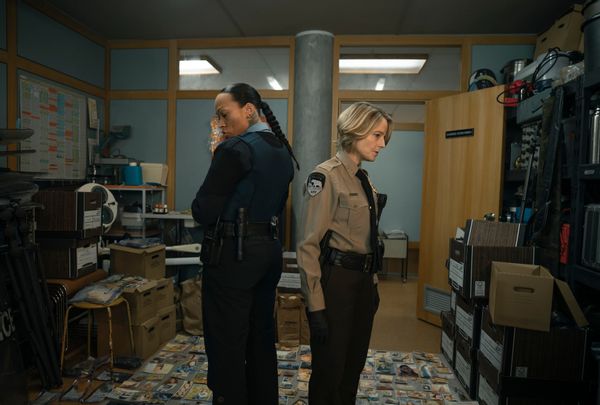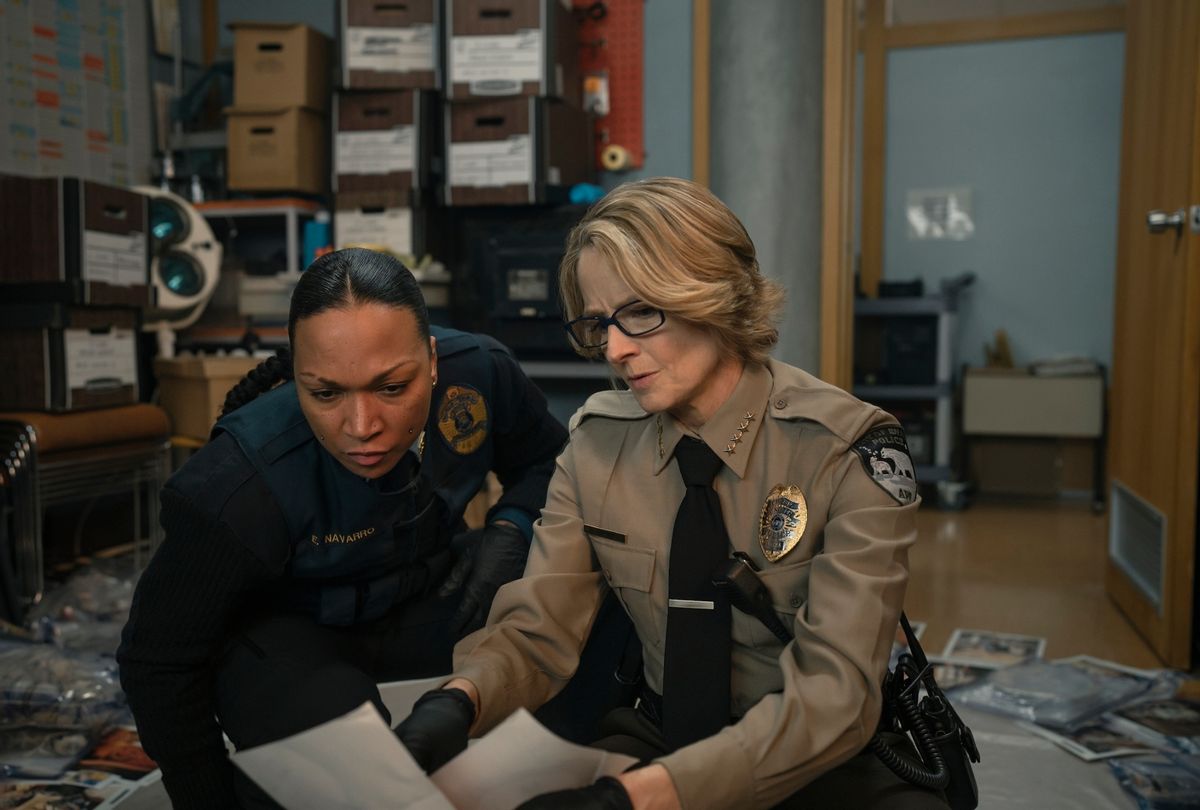When it was first announced in 2022 that Jodie Foster would be taking on her first major adult TV role as one of two female leads in “True Detective: Night Country,” there was a sweeping assumption that her character would be gay. And not just because Foster herself identifies as such.
“Jodie, no!” I screamed in surprised confusion, feeling my expectations for this season crumble.
In the initial teaser trailer for the show’s fourth season, we get the first glimpse of her in action as Chief Liz Danvers, seated behind her desk talking about how “Some people come to Alaska to escape. To get away from something.” Working to piece together a mystery in the fictional town of Ennis as it braces for weeks of endless darkness, she later has a tense exchange with Trooper Evangeline Navarro — played by queer professional boxer turned actress Kali Reis — telling her, “We’re just gonna do this one thing. Work together to close this case. And that’s it for the two of us.” And for as coded as the dynamic between the two of them is, the first big scare of the season comes quick when we learn that, once again, the potential to add to the queer canon was sacrificed in favor of protecting ratings.
In the second episode, titled “Part 2,” Danvers has matter-of-fact sex with Captain Ted Connelly (Christopher Eccleston), who is very much not her hot female co-star, and the sight of it abruptly snapped me out of the lavender haze I was shrouded in going into this. “Jodie, no!” I screamed in surprised confusion, feeling my expectations for this season crumble with each baffling thrust. And I wasn’t alone in this. Aside from my wife screaming similarly beside me on the couch, others reacted in equal fashion. And while, obviously, it’s perfectly fine (important even) for gay actors to be able to play straight whenever the role calls for it, who called for this, exactly? Aside from the hordes of straight men ready to review bomb the season regardless, just because it features women as leads.
After premiering on HBO and Max on Jan. 14, “Night Country” showrunner Issa López spoke out against “bros and hardcore fanboys” of the series’ earlier seasons who participated in lowering the audience score on Rotten Tomatoes.
“So, if you liked last night’s episode, and have a Rotten Tomatoes account, maybe head over there and leave an audience review?” López reportedly wrote on X, which she later deleted. “The bros and hardcore fanboys of [Season 1] have made it a mission to drag the rating down, and it’s kind of sad, considering all the 5 star ones.”
In another post, which has also since been deleted, she wrote, “I despise review bombing of any kind, but A: our audience score in RT is much better now, and B: I used a generalization about who was bombing. And generalizations are ALWAYS a mistake. SO MANY beautiful bros and TD S1 hardcore fans loved our ep 1!”
Want a daily wrap-up of all the news and commentary Salon has to offer? Subscribe to our morning newsletter, Crash Course.
In an interview with The Independent, Kali Reis reacted to this level of trolling herself, saying, “If they could just get their heads out of season one’s a**, that’d be great. Issa did not attempt to rewrite the first season; there are connections to the first season, there’s an homage to the first season, but it is not trying to duplicate it.”
So this, compounded by original series creator Nic Pizzolatto publicly bashing the new season, calling its references “stupid” and saying, “I certainly did not have any input on this story or anything else. Can’t blame me,” point to an ingrained issue that higher-ups may have felt the need to get in front of. And what better way to do that than to defy all subtext by making it as outwardly straight as humanly possible? Because apparently masculine women who sleep with men are a safer bet than gay women when it comes to ratings.
 Kali Reis and Jodie Foster in “True Detective: Night Country” (Michele K. Short/HBO)
Kali Reis and Jodie Foster in “True Detective: Night Country” (Michele K. Short/HBO)
In a deep dive to determine why and how “Night Country” ended up being the gayest straight show ever, I landed on a big clue. In a 2023 interview with Vanity Fair, Issa López talks about her vision for Foster’s and Reis’ characters in an initial draft, saying, “When I talked to HBO about the first draft, I was like, deep down, this is a rom-com. These are two characters that love each other, found each other and fell in love, and then fell out of love terribly. Now they’re enemies. And that’s when we meet them. And the show is the story of how they fall back in love. This is friendship. But in the end, it’s the same thing.” (Salon reached out to the publicists for “Night Country” regarding this quote and received the following response: “HBO and Issa don’t have comment to provide.”)
What changed between then and now? Fear.
This can be interpreted in two ways, I suppose, just like the word “partner” can mean two things depending on who’s saying it, but from my perspective, it’s very telling. What I take from that quote is that these characters and the relationship they had, and continue to have, feels gay because that’s the way it’s supposed to feel. What changed between then and now? Fear. Fear of never moving past the show’s initial pitch. Fear of review bombing. Fear of low ratings in the wake of numerous other LGBTQIA series that got cancelled because even now, in 2024, normy audiences still can’t make room for depictions of relationships that wouldn’t be conveniently marketed to in a Hallmark store, if they even have those anymore.
“Night Country” was bent for the straights, if that’s the way they want it. And those still catching up after the first episode, who may have been holding on to hope that Danvers and Navarro would hook up later in the season, are sure to be disappointed. Spoiler alert. Sorry. But at least straight men are happy-ish. Right?
Read more
about this topic

